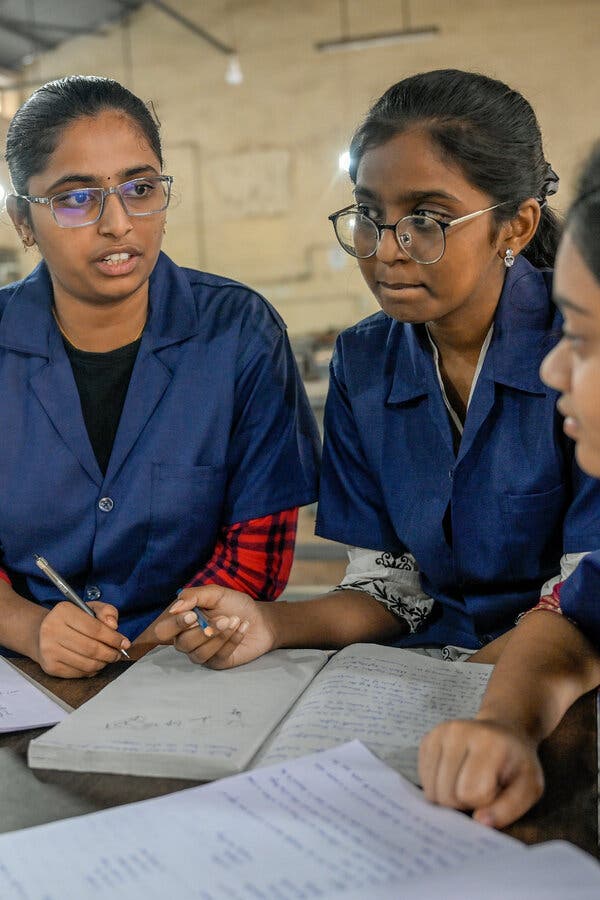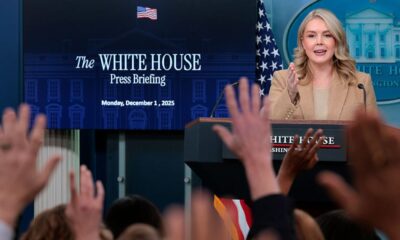Education
New Visa Fee Disrupts Dreams of Indian Students and Professionals

A new directive from the White House has introduced a significant fee for H-1B visa applications, impacting thousands of aspiring Indian professionals. On September 19, 2023, President Donald Trump announced that each H-1B visa would now incur a fee of $100,000, a decision that has left many students and their families in despair.
Seventeen-year-old Sai Jagruthi, an engineering student at Jawaharlal Nehru Technological University in Hyderabad, vividly recalls her reaction. After finishing dinner, she received the news from her father. “My dreams were shattered,” she expressed, highlighting the deep disappointment felt by many in her situation. For families like hers, the H-1B visa has long represented a pathway to better opportunities in the United States.
The H-1B visa program has been a crucial avenue for skilled Indian workers, with approximately 72 percent of the 400,000 visas granted last year going to Indian applicants. The new fee, which is higher than the average first-year salary for many visa holders, threatens to disrupt this established route for employment and education.
Impact on Education and Career Aspirations
Students at institutions such as Jawaharlal Nehru Technological University, with its enrollment of 450,000, are particularly affected. An estimated 20 percent of graduates aim to pursue advanced studies in the United States, often with the goal of obtaining H-1B visas. Classmate Ruthvitch Sharma, who dreams of working with NASA, stated, “Everyone in my shoes has a similar ambition: to work with the greatest talents in the world.”
In the immediate aftermath of the announcement, confusion ensued as the White House clarified that the $100,000 fee would apply only to new visa applications. Additionally, a federal agency proposed replacing the annual lottery system with one that prioritizes the highest-paid applicants. These alterations are expected to compel companies to hire fewer foreign workers and potentially increase wages for American employees.
The new policies complicate ongoing U.S.-India trade negotiations and raise concerns among students who view the United States as a vital destination for their careers. For many, alternative options are becoming increasingly appealing. Countries such as Germany, China, and Canada are positioning themselves as viable alternatives for Indian students seeking advanced education and career opportunities.
Reactions from Students and Professionals
The sentiment among students is one of betrayal and frustration. Santosh Chavva, a final-year undergraduate in artificial intelligence, expressed shock at the announcement. He had been exploring graduate programs in the U.S. but now faces the reality that pursuing an expensive American degree might lead to financial strain without the promise of a corresponding salary.
Families are notably affected, as the costs associated with obtaining a degree in the U.S. can be astronomical. Mr. Chavva’s family, for instance, has already invested approximately $34,000 for his education in India, with further expenses for a master’s program in the U.S. potentially requiring several additional years of savings.
The changes pose a challenge not only for individual students but also for companies like Tata Consultancy Services, which relies heavily on the H-1B visa program to deploy thousands of Indian nationals to the U.S. The company’s stock has reportedly lost $50 billion since the announcement, reflecting the broader impact on the Indian IT sector.
Despite the challenges, some students are finding silver linings. Narra Lokesh Reddy, a hopeful entrepreneur, believes that the current situation may encourage innovation and self-reliance within India. “Forcing us to stay at home might push India to self-reliance,” he remarked.
In Hyderabad, those already holding H-1B visas are expressing gratitude for their current status. Many visit the Chilkur Balaji Temple to give thanks, while others remain cautious about discussing their futures. A father from Plano, Texas, celebrated the extension of his visa but requested anonymity to avoid jeopardizing his status.
Sai Jagruthi is considering her options, stating, “If the U.S. does not work out, I will try Germany.” The head priest at Chilkur Balaji, C.S. Rangarajan, encourages his congregation to maintain perspective. He noted that while visa issues are pressing, they should also focus on broader life goals. “Trump is here for a few years; Balaji is forever,” he emphasized.
As young Indians navigate their futures, the evolving landscape of international education and employment presents both significant challenges and new possibilities.
-

 Technology5 months ago
Technology5 months agoDiscover the Top 10 Calorie Counting Apps of 2025
-

 Health2 months ago
Health2 months agoBella Hadid Shares Health Update After Treatment for Lyme Disease
-

 Health3 months ago
Health3 months agoErin Bates Shares Recovery Update Following Sepsis Complications
-

 Technology4 months ago
Technology4 months agoDiscover How to Reverse Image Search Using ChatGPT Effortlessly
-

 Technology1 month ago
Technology1 month agoDiscover 2025’s Top GPUs for Exceptional 4K Gaming Performance
-

 Technology2 months ago
Technology2 months agoElectric Moto Influencer Surronster Arrested in Tijuana
-

 Technology5 months ago
Technology5 months agoMeta Initiates $60B AI Data Center Expansion, Starting in Ohio
-

 Technology5 months ago
Technology5 months agoRecovering a Suspended TikTok Account: A Step-by-Step Guide
-

 Health4 months ago
Health4 months agoTested: Rab Firewall Mountain Jacket Survives Harsh Conditions
-

 Lifestyle5 months ago
Lifestyle5 months agoBelton Family Reunites After Daughter Survives Hill Country Floods
-

 Technology4 months ago
Technology4 months agoHarmonic Launches AI Chatbot App to Transform Mathematical Reasoning
-

 Technology3 months ago
Technology3 months agoUncovering the Top Five Most Challenging Motorcycles to Ride




















